International Transport and Logistics (Course)
Online Course: “Introduction to International Transport and Logistics” (5 ECTS). Containerization. Documents

The Professional Course “Introduction to International Transport and Logistics” taught by EENI Global Business School consists of four subjects:
- Introduction to International Transport
- Containerization
- International transport documents
- International Federation of Freight Forwarders Associations (FIATA)
 Enrol / Request for Information
Enrol / Request for Information

- Credits: 5

- Duration: 4 weeks It is recommended to dedicate about twelve hours of study per week following a flexible schedule. It is possible to reduce the duration dedicating more hours a week
- Tuition Fees: 120 Euros
- Open Online Enrollment
- Download the syllabus (PDF) of the Course
Languages: 
- Also available in For improving the international communication skills, the student has free access to the learning materials in these languages (free multilingual training).
 Introduction au transport
Introduction au transport  Transporte internacional
Transporte internacional  Transporte internacional
Transporte internacional

This course contains exercises that are evaluated, which the student must work out and pass to obtain the Diploma of the Professional Course: “Introduction to International Transport and Logistics” issued by EENI Global Business School.
Aimed at: all those people who wish to introduce in international transport and logistics for import and export operations.
This course belongs to the following Higher Education Programs taught by EENI:
Diplomas: International Transport, Foreign Trade.

Masters: International Transport, Transport in Africa, International Business, Foreign Trade.
Doctorate: Global Logistics, World Trade.
Course: Foreign Trade Assistant.
Structure of the Course
1- Introduction to International Transport and Logistics applied to Foreign Trade
- International Logistics and International Trade
- Global transport chain
- Authorized Economic Operator (AEO)
- Selecting a mode of International Transport
- Documents, costs and insurance of International Transport
- Case Study:
- FEDEX
- UPS
- Export Packaging
- Importance of an appropriate export packaging
- Types of packaging materials
- Electronic tagging
- Marks on packaging
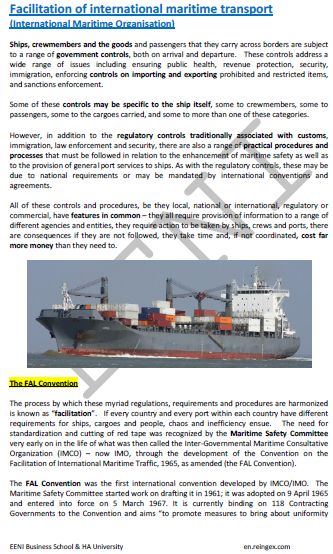

- Trade Facilitation Agreement
- World Customs Organization (WCO)
- Kyoto Convention
- Convention Harmonization of Frontier Controls of Goods
Legislative texts related to International Transport of the UNCITRAL.
- United Nations Convention on the Carriage of Goods by Sea (Rotterdam Rules) (1978)
- United Nations Convention on the Liability of Operators of Transport Terminals in International Trade
Objectives:
- To understand the importance of a correct logistics and transport management for the international trade
- To analyze the modes of transport (marine, air, road, train, and multimodal) and their characteristics
- To familiarise the student with the different types of packaging, packaging materials, pallets and containers, packing marks, modes of transport and packaging, and the criteria to be used when selecting an appropriate packaging for particular shipments
- To know how to calculate the logistics costs of an export or import
- To analyze the role of the UN Commission on International Trade Law (UNCITRAL) in international transport
This will be achieved by:
- Analysing the factors to consider when selecting a mode of transport
- Learning about the logistics process and the different concepts involved in logistics
- Examining the different logistical infrastructures
- Analysing the factors to be considered when choosing a logistics company
- Examining the various transport and insurance documents that are required when importing and exporting
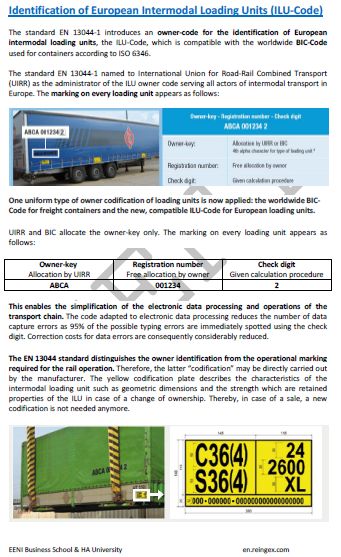
2- Containers and international transport.
- Introduction to the Containerization
- Customs Convention on Containers
- Convention Relating to Temporary Admission
Objectives:
- To understand the importance of the containerization in international transport
- To understand the role of the International Bureau of Containers and Intermodal Transport
- To know the marking requirements for the Containers (BIC Code, plates, identification...)
- To analyze the main international conventions related to the Containerization

3- Transport Documents related to Foreign Trade
- The role and function of the Transport Documents in international trade
- Negotiable bills of lading
- Non-negotiable sea waybills
- Other transport documents
- Electronic alternatives to the traditional transport documents
- Multimodal/combined transport documents
Objectives:
- To analyze the main documents related to International Transport of goods
- To understand the functioning of the Bill of Lading (negotiable and non-negotiable)
- To know the advantages of the electronic transport documents
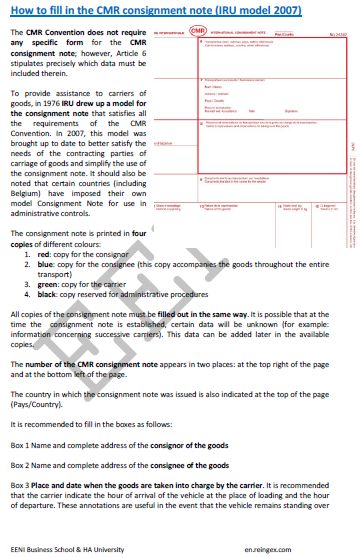
4- The role of the International Federation of Freight Forwarders Associations (FIATA) in international transport.
- Introduction to the FIATA
- Negotiable Combined Transport Bill of Lading (FBL)
- Electronic FIATA Bill of Lading
- FIATA Multimodal Waybill FWB
- Forwarders Certificate of Receipt (FIATA FCR)
- Forwarders Certificate of Transport (FCT)
- Warehouse Receipt
Objectives:
- To understand the fundamental role of the FIATA as the architects of the International Transport
- To analyze the FIATA transport documents (FBL, FWB, FCR...)
- To analyze the functioning of the Electronic FIATA Bill of Lading
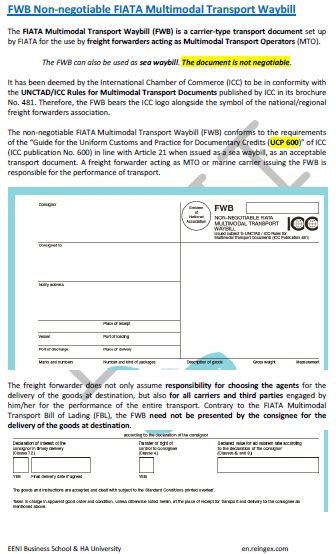
The delivery of the product is the consequence of its sale, therefore, the transportation constitutes a consubstantial element of the international trade activity.
In foreign trade, more complex transportation needs arise due to the geographical distance, the regulatory requirements of the different countries, the need that sometimes exists to use different types of transport, the storage that may be necessary before the final delivery to the customer, the reservation of cargo spaces, packaging... and in short all the particularity of the international trade.
No exporter can approach an export transaction without taking into account its Transport and Logistics requirements. This course will give the student a thorough understanding of the main modes of transport in international trade and address the more common management issues related to them.
Transportation is one of the main component factors taken into account when determining the final price of a product.
Transport documents perform two functions:
- It is a proof of the existence of the contract of carriage
- It is a proof of receipt of the products by the carrier
This course includes the most common transport documents (Bill of Lading, AWB, Consignment Note, etc.), on which the student analyses how they should be completed.
While in transit, the goods are exposed to the risk of damage and thefts. Therefore, it is recommended to ensure the products. The importer or the exporter will agree about who is the responsible for the insurance.
Although the packaging of the products might seem of small importance; it is one of the fundamental aspects of the international trade. The packaging of the goods should protect the products during the transport and prevent theft; it should be economic and achieve a balance between the effectiveness and cost (both from the material used and the time spent on packing the products).
Companies with small experience in international trade are recommended to work with an intermediary company who has experience in the packaging for export.
In a very competitive markets, the delivery times are usually very strict, a late delivery of a product may mean losing a client, so the correct coordination of all the activities to be carried out in the process from the beginning of an operation until it is finished, it constitutes an essential task.
This task of coordinating all the phases necessary for the client to receive his product in time and form is what we understand by logistics.
Logistics is the process of planning, implementation, and control of both physical and information flow, as well as the storage of raw materials, semi-finished and finished products, from the point of origin to the end consumer most efficiently and effectively possible.
Any exporting company must plan and coordinate the following functions related to the logistics:
- Procurement of materials
- Manufacturing: transformation of the raw materials into finished products
- Storage and distribution
Sample: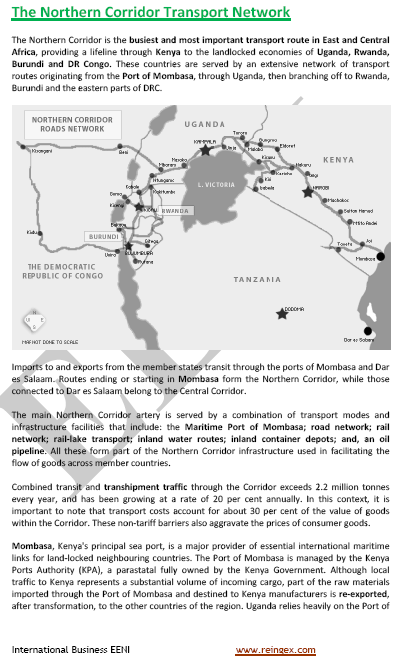
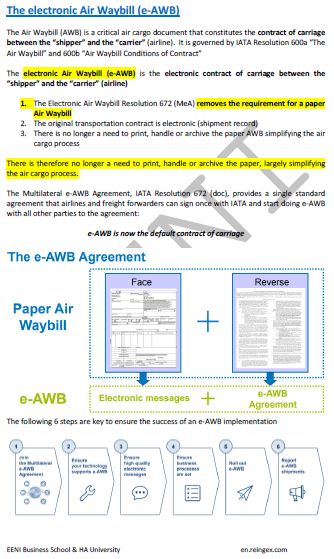
(c) EENI Global Business School (1995-2024)
We do not use cookies
Top of this page



